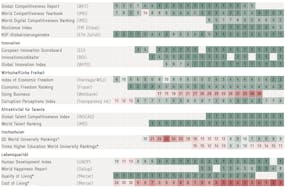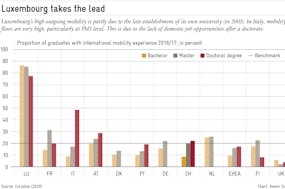In comparison with other countries, Switzerland’s labor market is particularly flexible thanks to its liberal legislation. Companies face few constraints regarding their hiring or dismissal procedures, wage setting and working schedules. This approach is appreciated by many companies as it enables a direct dialogue between employer and employees.
The authority to set rules for the labor market is largely decentralized and delegated to its social partners (companies or employer’s organizations on the one hand, unions or employee’s organizations on the other). They can agree on a series of rules, which are formalized and implemented through a Collective Labor Agreement (CLA). CLAs are primarily agreements made between employers or association of employers and worker’s associations (trade unions), with the objective to regulate working conditions, contractual terms, wages, holidays, work schedules, rights and obligations of both parties and ensuring that the CLA is duly enforced by the members having adhered to it.
This liberal approach to work is deeply rooted in the country’s culture and has long enjoyed widespread popular support. There have been various federal referendums calling for additional regulations or restrictions in the labor market, such as: 6 Weeks Paid Vacation for All (2012), Initiative 1:12: recommending a fixed range between the highest and the lowest salary in a company (2013), and the Federal Minimum Salary (2014), but all were blatantly rejected. The only exception was the Minder initiative adopted in 2013. It denoted the nation’s exasperation regarding certain policies, which excessively benefitted the compensation arrangements of senior executives in some large companies based in the country.
Free Movement of Persons and Accompanying Measures
Swiss labor conditions are undoubtedly attractive on many levels and even though Switzerland is not a member of the European Union (EU), there is a substantial interaction between both parties on various matters. This continuous dialogue led to the signing of “Bilateral Agreements” between Switzerland and the EU, and in particular an Agreement on the Free Movement of Persons (AFMP). Since 2002, this agreement allows EU citizens to establish themselves in Switzerland after signing a work contract with a Swiss employer and to enjoy the same rights and benefits as Swiss workers. Companies based in EU member states also gained the right to detach workers in Switzerland for a maximal 90-day period. Reciprocity is of course guaranteed and Swiss citizens also have the right to work in EU member states.
The ratification of the AFMP did generate some political concerns as to how it could potentially impact the domestic labor market. It was especially feared that foreign newcomers entering the labor market would allegedly lead to a decrease in salaries and cause a negative pressure on domestic workers; either on the jobs available or on the general level of remuneration. This political concern is still relevant today. In order to address it, a set of Accompanying Measures (AMs) was established in 2004, as a political support to the Free Movement of Persons (FMP). Ever since, the AMs have been constantly reassessed with a tendency to incorporate additional restrictions on the liberal labor market.
What do these AMs concretely entail? They can be broken down into three main categories:
- Facilitated expansion of the scope of CLAs : The main purpose of a CLA is mainly to define the employees’ working conditions in a given sector, and may include a section regarding minimal wages. The CLA applies only to employers and employees who are either directly part of a CLA, or members of organizations who have signed a CLA. However, under certain conditions (“in case of abusive and repeated wage-dumping”, according to the legal definition), the AMs allow organizations to force the expansion of a CLA upon all employers and workers of a given sector; even to those who explicitly did not wish to enter this agreement. The AMs make it easier to coerce this expansion, as opposed to the ordinary CLA extension process, as it is already applicable if the employers, having adhered to the CLA, employ a majority of workers in a given sector. This opportunity to expand CLAs, in particular forcing a whole economic sector to apply minimal wages regulations, has been widely used in Switzerland by many employer organizations and unions.
- Standard Employment Contracts (SEC): In the absence of a CLA, SECs can be established in order to define the clauses governing the formation, nature, and termination of certain types of employment relationships. These can become mandatory for a given economic sector. Minimal wages are at the core of the SECs.
- Foreign Companies and detached employees in Switzerland: Foreign companies established in Switzerland, or having detached their employees in the country, must abide by the rules of the Swiss labor market in matters relating to minimum wage and working conditions. The control and application of the AMs are shared amongst employer’s organizations, unions and the State.
Avenir Suisse’s Assessment:
In its latest publication, Avenir Suisse assesses the situation ten years after the implementation of the AFMP and the AMs. Three main components can be recapped as follows:
- The AFMP has not had a negative impact on the Swiss labor market as it was initially feared. The unemployment rate has remained low and the overall activity rate high. The global level of salaries has regularly increased, although not in an equal proportion in all economic sectors. The additional workforce brought forth by EU citizens is, in its large majority, comprised of highly skilled people who were not available on the domestic market.
- AMs have not proven their full contribution to the already stable situation of the Swiss labor market. Contrary to their main initial objective, which was to protect domestic workers from a disproportionate impact on their wages, the AMs are now mostly protecting the “insiders” (those already employed) and tend to create higher thresholds for the “outsiders” trying to enter (or re-enter) the labor market; newcomers, persons re-qualifying in other economic sectors or senior workers.
- AMs are detrimental to the cardinal principle of a liberal and flexible labor market; one of the key success factors of the country in the last decades and a competitive advantage that should be maintained. They create a form of “cartelization” of the labor market whereby their constant extension creates a new path towards a regulatory framework. This clearly contradicts the Swiss liberal tradition and undermines the competitiveness of the Swiss domestic labor market by adding an incentive to automation and delocalization.
Avenir Suisse suggests that AMs should remain, as their names suggests, temporary measures and not definitive ones. They should be diminished over time and not expanded indefinitely. Resolutions regarding AMs should be based on factual and economic factors, not political ones, and permitted only in economic sectors where a distinct distortion of the labor market can be proven: as would be the case where the average real wage level in a given sector has been pulled downwards.
Sources:
Tobias Schlegel, Libre circulation et mesures d’accompagnement – Pas de corset pour le marché du travail (Avenir Suisse, May 2017)
Tibère Adler, Labor: The road to a regulatory inferno is paved with good intentions (Avenir Suisse, June 2017)
Conventions collectives de travail, Secrétariat d’Etat à l’économie (SECO)
Free Movement of Persons Switzerland – EU/EFTA, State Secretariat for Migration (SEM)





